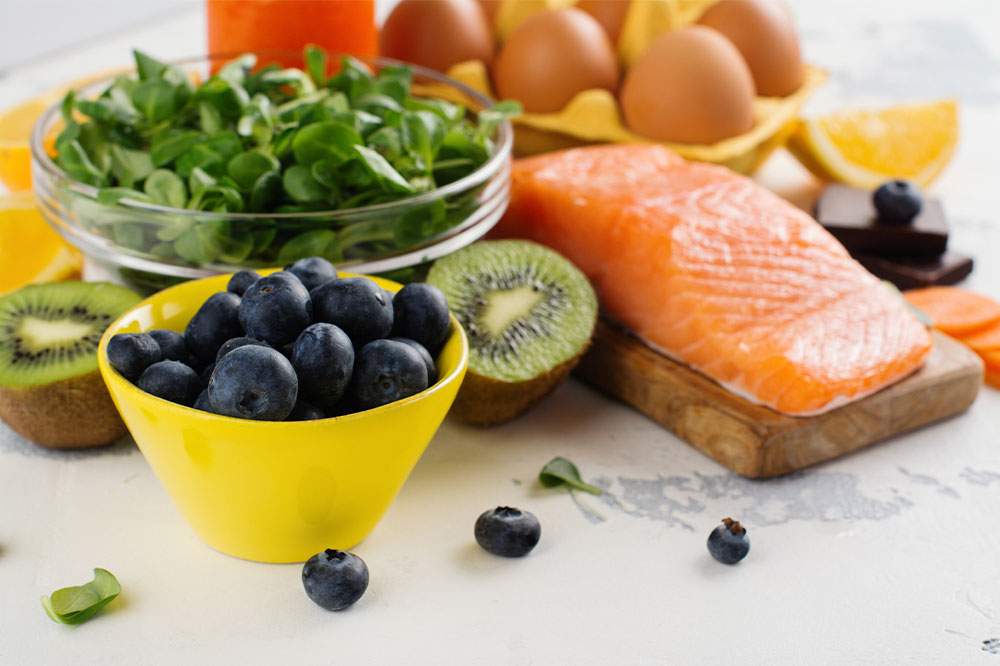7 vitamins that promote eye health

The eyes are a vital sensory organ of the human body that helps us interpret our surroundings and respond to them. Hence, investing time and effort in eye care is necessary. Not doing so can increase the risk of several eye ailments, especially with age. While there are many ways to maintain eye health, nutrition plays an important role. Specific vitamins replenish the body and are required for healthy eyes and good eyesight.
Vitamin E
Vitamin E helps prevent age-related eye diseases like cataracts and macular degeneration. Besides using chewables that have this vitamin, one can avoid dark circles by applying vitamin E-oil under the eyes. Some foods rich in this nutrient are peanuts, almonds, hazelnuts, leafy greens, pumpkin, and wheat germ oil. Apart from promoting healthy eye lenses, vitamin E helps deal with various health conditions, thanks to its antioxidant properties.
Vitamin A
Night blindness is an eye disorder caused by a lack of rhodopsin, a photopigment activated by vitamin A. Therefore, the body requires sufficient vitamin A to prevent the problem. This nutrient also helps maintain the cornea. Carrots are among the richest sources of vitamin A, and they also have high levels of beta carotene, a natural compound that helps fight many ailments. Other suitable foods are tomatoes, bell peppers, milk, eggs, beef liver, and mangoes.
Vitamin C
A regular intake of vitamin C is imperative for healthy lenses. The nutrient performs various functions to promote eye health, such as protecting the eyes from harmful UV rays, reducing the risk of age-related macular degeneration, and facilitating the development of collagen (a protein that helps retain eye structure). The best sources of vitamin C are blackcurrants, potatoes, Brussel sprouts, corn, oranges, papayas, and peppers.
Vitamin B1
Vitamin B1, or thiamine, helps strengthen the optic nerves and prevent cataracts and other eye lens problems. Its deficiency causes blurred vision, eventually leading to blindness in severe cases. Cereals, fish, beans, seafood, nuts, flax seeds, sunflower seeds, and tofu are packed with vitamin B1 and should be added to the meals regularly for better eye health.
Vitamin B2
Vitamin B2, also called riboflavin, helps reduce oxidative stress in the eye lenses and prevent cataracts. It is found in several foods, including chicken, eggs, beef, lean meats, milk and milk products, mushrooms, and tofu. The recommended daily intake of vitamin B2 is 1.1 to 1.3 mg. Besides good eyesight, it promotes growth and overall health.
Vitamin B6
Studies have shown that vitamin B6 may help regulate homocysteine levels in the blood and prevent age-related macular degeneration. A deficiency of this vitamin is linked to blockages in the veins connecting to the retina, which can cause various retinal issues. Vitamin B6 can be found in salmon, cereals, beef liver, potatoes, carrots, tuna, eggs, and sweet potatoes.
Vitamin B12
Vitamin B12 is another nutrient that can help prevent macular degeneration and blurred vision. In addition, it may help recover from dry eye syndrome and relieve burning sensations in the eyes. The vitamin is present in foods like clams, beef, milk and milk products, cereals, red meat, and steamed mussels.
Besides well-known eye disorders like macular degeneration and cataracts, a deficiency in essential vitamins can cause astigmatism. It is an eye condition where the cornea is curved differently, leading to blurred vision. Besides adding foods with eye-healthy vitamins to the meals, doctors recommend contact lenses for minimizing the effects of astigmatism. However, choosing the right contact lenses is vital as some are more suitable for dealing with this disorder. One may also use contact lenses for other eye problems like nearsightedness, farsightedness, and presbyopia. It is best to consult a doctor to choose the right type depending on the condition.






